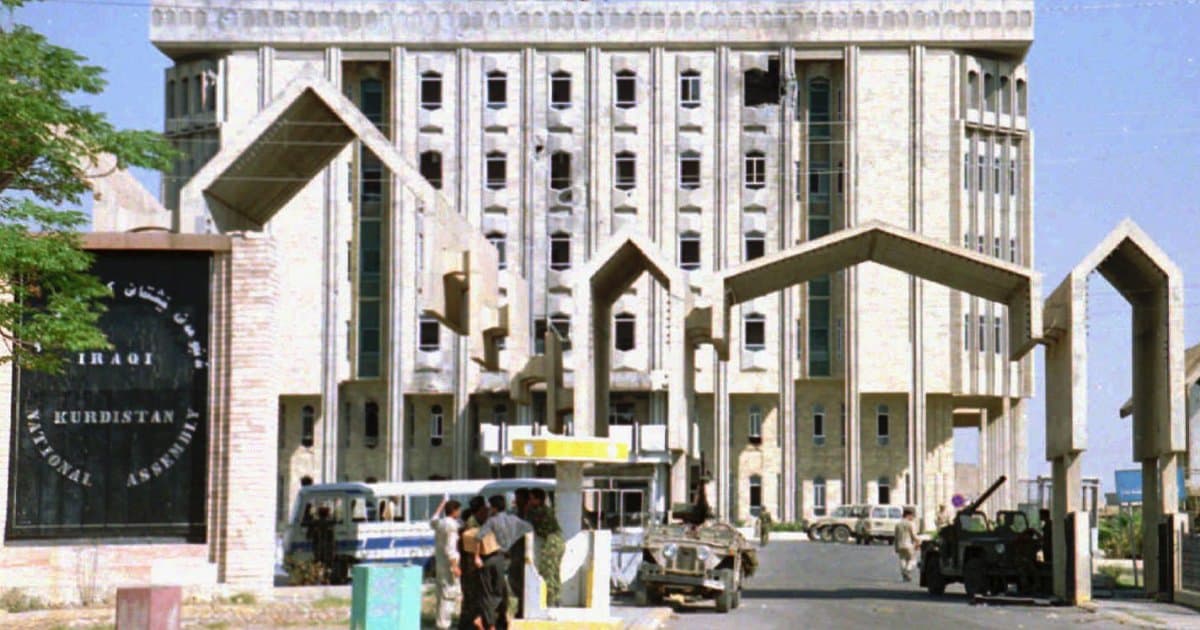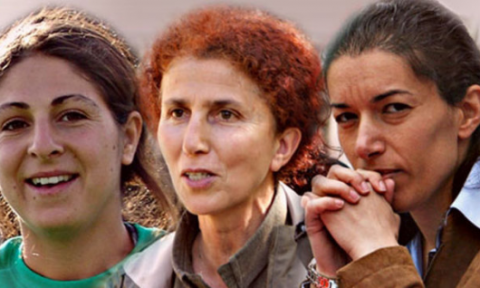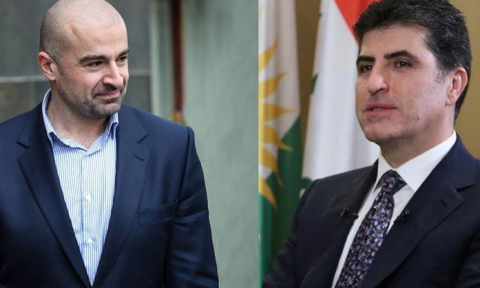Sentences spark outrage across the Kurdish region where press freedom has been in precipitous decline for some time.
By Sofia Barbarani and Hakeem Dawd Qaradaghi
Baghdad, Iraq – Iraqi Kurdish journalists Sherwan Sherwani and Guhdar Zebari were sentenced to six years in jail in a move that has been labelled “unfair and disproportionate” by press freedom group the Committee to Protect Journalists (CPJ).
The men were arrested in the Kurdish region of Iraq in October last year following their coverage of anti-government protests in Duhok, a province controlled by the ruling Kurdistan Democratic Party.
On Tuesday, they were found guilty by an Erbil criminal court of jeopardising Kurdish national security, citing social media exchanges in which the journalists critiqued the government. The evidence, Sherwani’s lawyer told CPJ, was “insufficient and baseless”.
The sentences sparked outrage across the Kurdish region, where press freedom has been in precipitous decline for some time. Most Kurdish political parties, including the leading Patriotic Union of Kurdistan and Gorran Movement, condemned the verdict.
In 2020 at least 385 violations were committed against 291 journalists and media outlets, according to the Kurdish press freedom group Metro Center.
“With this verdict, the Kurdish authorities are sending a clear message: the press freedom that they claim to defend and to uphold and to respect is not being respected,” Ignacio Miguel Delgado, the CPJ Middle East and North Africa representative, told Al Jazeera.
“Iraqi Kurdistan keeps claiming that it’s the only democracy [in the region] and it takes pride in that,” said Delgado. “But what we have witnessed throughout 2020 and into this new year is the exact opposite, at least as far as press freedom goes.”
When protests broke out in the Kurdish region in August last year, security forces were accused of beating and detaining journalists covering the social unrest. Two months later, Sherwani and Zebari were arrested.
‘They did not tell us where they were taking him’
Sherwani’s wife, 37-year-old Rugesh Jabbari, was alerted to the presence of strangers inside her home by her screaming son.
Dozens of uniformed and plain-clothes men burst through the family’s front door on October 7 last year, demanding to see the journalist.
“They handcuffed him in front of my children and put their guns on his head,” Jabbari told Al Jazeera. “They seized Sherwan’s smartphone, laptops, notebooks, our CCTV.”
Jabbari and her children watched helplessly as the men escorted Sherwani into a vehicle and drove him away. “They did not tell us why and where they were taking him. We did not know his whereabouts for 19 days,” she explained.
Since then, Jabbari has been granted access to her husband on one occasion, for a total of five minutes.
“He told me that he was locked up in confinement for 68 days … he was in very poor conditions – weak, thin and tired. I could clearly notice he had been tortured,” said Jabbari.
Murky process
Media watchdog Kurdistan Watch said the defendants – including Sherwani, Zebari and three activists – have been subjected to overcrowded prison cells, torture and other forms of intimidation, in addition to being denied regular access to lawyers.
The whole process, said Mahmood Yaseen of Kurdistan Watch, has been a murky one. “We believe the trial was untransparent and unfair,” Yaseen told Al Jazeera.
Kurdish member of parliament Gulistan Saeed, who attended the two-day trial, said the families of the jailed were prevented from being there, despite it being an open trial. “It [happened] under huge military presence,” she explained.
In a statement issued on Thursday, the Kurdish government’s Office of the Coordinator for International Advocacy said Sherwan and Zebari “were found guilty of gathering classified information and passing it covertly to foreign actors in exchange for substantial sums of money. This information directly put at risk the lives of senior Kurdish and foreign officials in Kurdistan”.
“The Kurdistan Regional Government [KRG] is fully committed to the rule of law, to fair and impartial legal process, and to the freedom of the media,” the statement said.
But the recent convictions, said Belkis Wille of Human Rights Watch, “further compound the Kurdistan region’s standing as a place in which journalists can be prosecuted merely for reporting on and critiquing government policies they object to”.
“Even more concerning in this case has been the inappropriate intervention by the Kurdistan Regional Government’s prime minister,” said Wille in reference to Prime Minister Masrour Barzani’s unsubstantiated claim that the arrested journalists were spies.
“His comments expose political intervention in free speech even at the highest levels,” Wille told Al Jazeera.
Opposition figures in the Kurdish region say they fear the sentence, based on social media exchanges, will pave the way to further crackdowns on freedom of speech.
“We are all aware that this cabinet has used violent repression against all sorts of freedom of expression,” said Kurdish member of parliament Shirin Amin, whose husband, journalist Kawa Garmyani, was murdered in 2013 following his investigation into corruption.
“I myself cannot exchange messages that contain information against the government. I fear they spy on me and intimidating consequences will follow,” Amin told Al Jazeera.
The defendants’ lawyers are expected to appeal the sentences, while 31 members of parliament addressed an open letter to the Kurdish region’s Court of Appeal asking for the sentences to be reviewed, according to local media.
“The convictions aren’t final yet, Kurdistan Region’s cassation court has to certify the ruling but it can also overturn it… It will depend on how much pressure the KRG will face to release them,” said Mahmood Yaseen of Kurdistan Watch.
The US embassy said in a statement it was closely following the case.
“The US has consistently engaged on the issue of freedom expression, including for members of the press, with KRG officials and will continue to do so,” it said. “Democratic societies respect freedom of expression and support the ability of press members to report without fear of retaliation.”
Prime Minister Barzani later tweeted: “I strongly urge everyone to respect the judiciary system in the Kurdistan Region and to let it do its job independently and without interference.”










